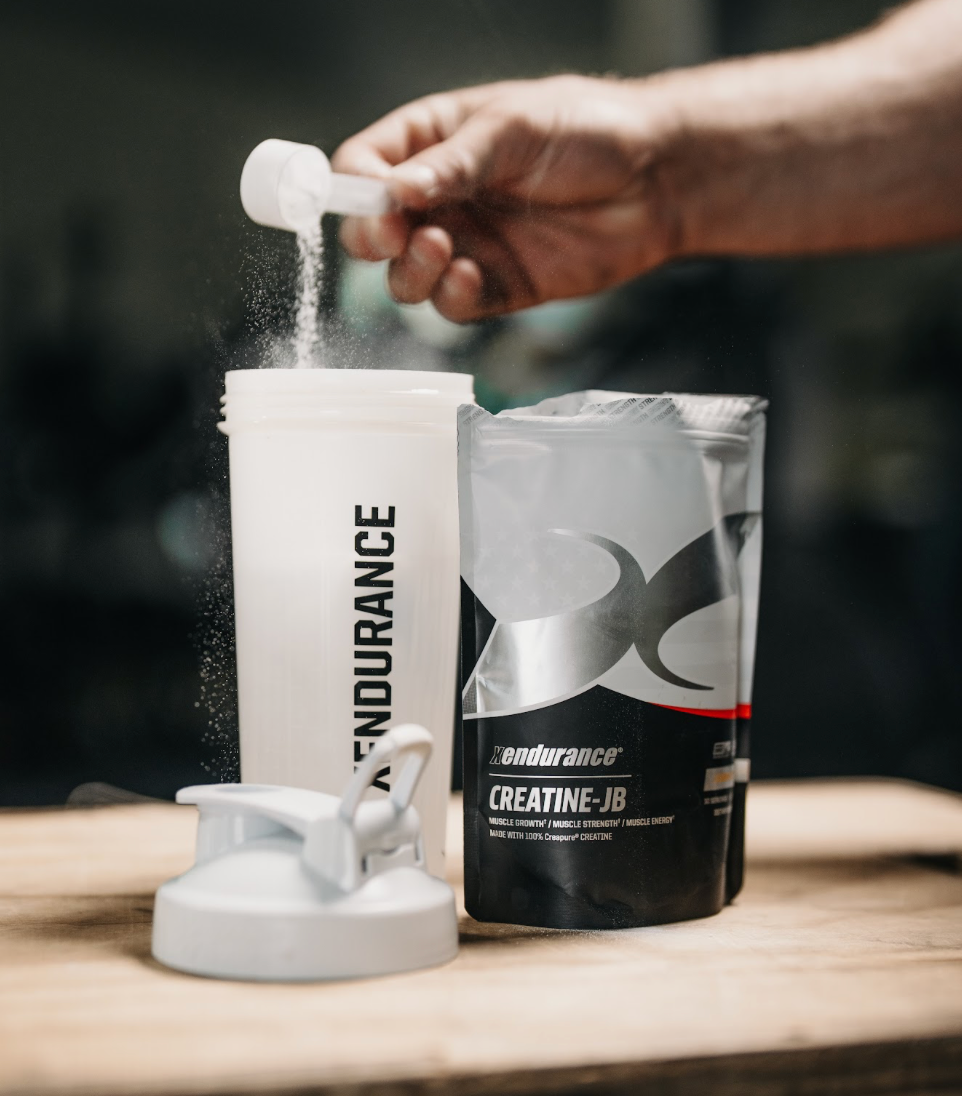Creatine is a household name in strength training circles, synonymous with muscle growth and explosive power. Yet, in the running community, it remains an under-the-radar supplement, often overlooked in favor of gels, electrolytes, or carb-loading strategies. This is a missed opportunity. Emerging research reveals that creatine, particularly high-quality forms like Creapure and innovative products like Xendurance’s Creatine-JB, can significantly enhance running performance, from sprint finishes to recovery between grueling sessions. In this comprehensive blog, we’ll explore why runners should consider creatine, unpack the science behind its benefits, compare Creapure to standard creatine monohydrate, and provide practical dosing and timing advice to power up your pace and recovery.
Why Runners Should Consider Creatine: The Science
Creatine is a naturally occurring compound synthesized from the amino acids arginine, glycine, and methionine in the liver, kidneys, and pancreas. It’s stored primarily in skeletal muscles (95%) as phosphocreatine (PCr), where it plays a critical role in regenerating adenosine triphosphate (ATP), the body’s primary energy currency. During high-intensity exercise, like sprinting or surging up a hill, ATP is rapidly depleted. Phosphocreatine donates a phosphate group to replenish ATP, allowing muscles to sustain power output. This mechanism is well-known in strength training, where short, intense efforts dominate, but its relevance to runners is less recognized.
For runners, creatine offers several scientifically backed benefits:
-
Enhanced Sprint Performance: Races often hinge on a final sprint or mid-race surges. A 2023 study found that creatine supplementation improved cycling power output in triathletes, translating to better performance in high-intensity segments. Similarly, runners can leverage creatine to boost anaerobic power for sprints, intervals, or hill repeats, with research showing a 7.5% performance increase in repeated sprints.
-
Improved Lactate Threshold: A 2003 study demonstrated that creatine increased lactate threshold by 5%, allowing runners to maintain a higher pace before fatigue sets in. This is critical for middle-distance runners (e.g., 800m, 1500m) and marathoners aiming to sustain race pace.
-
Glycogen Storage and Recovery: Creatine enhances glycogen storage by up to 20%, providing a readily available energy source for endurance efforts. It also promotes muscle protein synthesis and reduces exercise-induced muscle damage, speeding recovery after intense runs. A study on resistance-trained individuals showed faster recovery with creatine, a benefit that extends to runners managing high training loads.
- Cognitive Benefits: Long races demand mental sharpness. Creatine supports cognitive function by maintaining ATP levels in the brain, reducing mental fatigue during endurance events. Research from the University of Sydney showed up to 30% improvements in memory and intelligence with supplementation.
Despite these benefits, creatine’s association with bodybuilding has kept it off many runners’ radar. Concerns about water retention and weight gain—potential drawbacks for weight-bearing sports like running—also contribute to its underuse. However, modern formulations and strategic dosing can mitigate these issues, making creatine a game-changer for runners seeking marginal gains.
Creapure® vs. Basic Creatine Monohydrate
When choosing a creatine supplement, quality matters. Creatine monohydrate is the most researched and effective form, backed by over 300 studies. However, not all creatine monohydrate is created equal. Creapure, a premium brand of creatine monohydrate manufactured in Germany, stands out for its purity and bioavailability.
-
Basic Creatine Monohydrate: This is the standard form, typically sourced from various manufacturers, often in China. While effective, its purity can vary, with some products containing impurities like creatinine, dicyandiamide, or heavy metals. These impurities may reduce efficacy and, in rare cases, cause digestive discomfort. Basic creatine monohydrate is generally cheaper but may require careful vetting to ensure quality.
-
Creapure® Creatine Monohydrate: Creapure is 99.9% pure, produced under strict quality controls to minimize contaminants. Its high bioavailability ensures better absorption into muscles, maximizing benefits like ATP regeneration and glycogen storage. Creapure is also less likely to cause bloating or gastrointestinal issues, a concern for runners sensitive to water retention.
For runners, Creapure’s purity and reliability make it the preferred choice, especially when performance and recovery are paramount. Brands like Xendurance leverage Creapure to deliver a superior product tailored to athletes.
Creatine-JB by Xendurance: The Ultimate Runner’s Formula
Xendurance’s Creatine-JB is a standout supplement that combines 5g of Creapure creatine monohydrate with lactate, an innovative addition rooted in cutting-edge science. Unlike traditional creatine supplements, Creatine-JB is designed to address runners’ unique needs, offering benefits for both performance and recovery without the bloat associated with lower-quality creatine.
-
Why Creapure? Creatine-JB uses Creapure for its unmatched purity and bioavailability, ensuring runners get the full benefits of creatine—enhanced sprint power, faster recovery, and increased glycogen storage—without impurities or digestive issues. Its micronized form dissolves easily, making it convenient for daily use.
-
The Lactate Advantage: Creatine-JB includes lactate, a fuel source that enhances energy production during high-intensity exercise. Lactate, often misunderstood as a fatigue-causing byproduct, is actually a critical energy substrate. Pioneering research by Dr. George Brooks, a renowned exercise physiologist, revolutionized our understanding of lactate through the “lactate shuttle” hypothesis. Brooks demonstrated that lactate is produced in working muscles and shuttled to other tissues (e.g., the heart, brain, and other muscles) to be oxidized for energy. During intense runs, lactate buffers hydrogen ions, delaying acidosis and fatigue, and serves as a gluconeogenic precursor to maintain blood glucose levels. By including lactate, Creatine-JB provides an additional energy source, complementing creatine’s ATP-regeneration capabilities. This is particularly beneficial for runners during surges, sprints, or long runs where energy demands spike.
-
No Loading Phase: Unlike traditional creatine supplements that recommend a 20-25g loading phase for 5-7 days, Creatine-JB requires no loading, making it easier to integrate into a runner’s routine. Its lemon-citrus flavor and vegan, gluten-free formulation further enhance its appeal.
Creatine-JB’s combination of Creapure and lactate makes it a powerful tool for runners, supporting both anaerobic bursts (e.g., sprint finishes) and aerobic efforts (e.g., sustained race pace) while promoting recovery.
George Brooks’ Lactate Research: A Game-Changer
Dr. George Brooks’ work on lactate has reshaped exercise physiology. His 1980s lactate shuttle hypothesis debunked the myth that lactate causes muscle fatigue. Instead, Brooks showed that lactate is a dynamic fuel source:
- Lactate as Energy: During exercise, muscles produce lactate, which is transported via the bloodstream to other tissues. The heart and slow-twitch muscle fibers preferentially use lactate for energy, sparing glycogen stores. This is crucial for endurance runners, as it delays fatigue during long efforts.
- Buffering Acidosis: Lactate consumes hydrogen ions, reducing muscle acidity and allowing runners to sustain higher intensities. This aligns with creatine’s role as a hydrogen ion buffer, creating a synergistic effect in products like Creatine-JB.
-
Gluconeogenesis: Lactate is converted to glucose in the liver via the Cori cycle, maintaining blood sugar levels during prolonged runs. This is vital for marathoners and ultrarunners.
Brooks’ findings underscore why Creatine-JB’s lactate inclusion is a brilliant innovation. By combining Creapure creatine with lactate, Xendurance provides runners with a dual-energy system that enhances performance across various running demands.
Creatine to Power Up Your Pace and Recovery
So, how can creatine specifically power up your pace and recovery as a runner? Let’s break it down:
-
Pace: Creatine enhances anaerobic capacity, making it ideal for short, high-intensity efforts like 100m-400m sprints, interval training, or race surges. A 2023 meta-analysis found creatine improved ventilatory threshold, allowing runners to sustain higher intensities with less oxygen demand. This translates to sharper race pace changes and stronger finishes. For example, swimmers supplemented with creatine improved their final 50m sprint in a 400m race, a scenario analogous to a runner’s kick.
-
Recovery: Creatine’s ability to reduce muscle damage and inflammation accelerates recovery, enabling runners to handle high training volumes. Its antioxidant properties and role in glycogen replenishment further support post-run repair. Runners in high-load phases (e.g., marathon training) benefit most, as creatine mitigates overtraining risks.
-
Strength Training Synergy: Many runners incorporate strength training to improve economy and injury resilience. Creatine enhances strength gains, with studies showing greater improvements in bench press, squat, and power clean performance when combined with resistance training. Stronger muscles translate to better running efficiency and durability.
Optimum Dosage and Timing for Runners
To maximize creatine’s benefits, runners should follow evidence-based dosing and timing protocols tailored to their needs:
- Dosage:
- Loading Phase (Optional): For rapid saturation, take 20-25g of creatine monohydrate (split into 4-5 doses) daily for 5-7 days. This is effective but may cause water retention, which some runners avoid. Creatine-JB does NOT require a loading phase.
- Maintenance Phase: Take 3-5g daily to maintain muscle creatine stores. Lighter runners (e.g., <150 lbs) may suffice with 2-3g, while larger athletes may need 5-10g.
-
No Loading Alternative: Skip the loading phase and start with 3-5g daily. This takes ~4 weeks to saturate stores but minimizes bloating. Creatine-JB’s 5g dose aligns with this approach, requiring no loading.
- Timing:
- Pre-Run (Performance): Take 3-5g 30-90 minutes before running to boost energy for sprints or intervals. Combine with 50g of carbohydrates and protein to enhance uptake via insulin release.
- Post-Run (Recovery): Take 3-5g 30-90 minutes after running to promote glycogen replenishment and muscle repair. Pairing with a carb-protein meal (e.g., a smoothie) maximizes benefits.
-
Consistency: Daily supplementation is key, as creatine builds up in muscles over time. Timing is less critical than consistency, but avoid taking it with caffeine (e.g., coffee), as it may reduce absorption.
-
Hydration: Creatine draws water into muscles, so stay well-hydrated to prevent cramps or dehydration, especially before races.
-
Testing: Trial creatine during the off-season or low-stakes training to assess tolerance, as individual responses vary. Vegetarians and older runners may see greater benefits due to lower baseline creatine levels.
Practical Tips for Runners
- Choose Quality: Opt for Creapure-based products like Creatine-JB or third-party tested supplements (e.g., NSF Certified for Sport or Informed Sport) to ensure purity.
- Monitor Weight: Expect 1-2kg of water weight initially, which stabilizes over time. For weight-conscious runners, start with a low dose (3g) and skip loading.
- Consult Experts: If you have medical conditions or concerns, consult a sports dietitian or doctor before starting.
-
Integrate Strategically: Use creatine during high-intensity or strength-focused training blocks (e.g., pre-season) to maximize sprint and recovery benefits.
Run Stronger, Recover Faster: Creatine’s Role in Your Journey
Creatine is no longer just for bodybuilders—it’s a versatile supplement that can power up your pace and recovery as a runner. From boosting sprint performance and lactate threshold to enhancing glycogen storage and recovery, creatine’s benefits are grounded in robust science. Creapure creatine, with its superior purity, and innovative products like Xendurance’s Creatine-JB, with its lactate-infused formula, elevate these benefits for runners. By following optimal dosing (3-5g daily, with or without loading) and timing (pre- or post-run with carbs/protein), you can harness creatine’s potential to help shave seconds off your splits and bounce back faster. Embrace creatine as a secret weapon in your running arsenal, and watch your performance soar.









Leave a comment
This site is protected by hCaptcha and the hCaptcha Privacy Policy and Terms of Service apply.